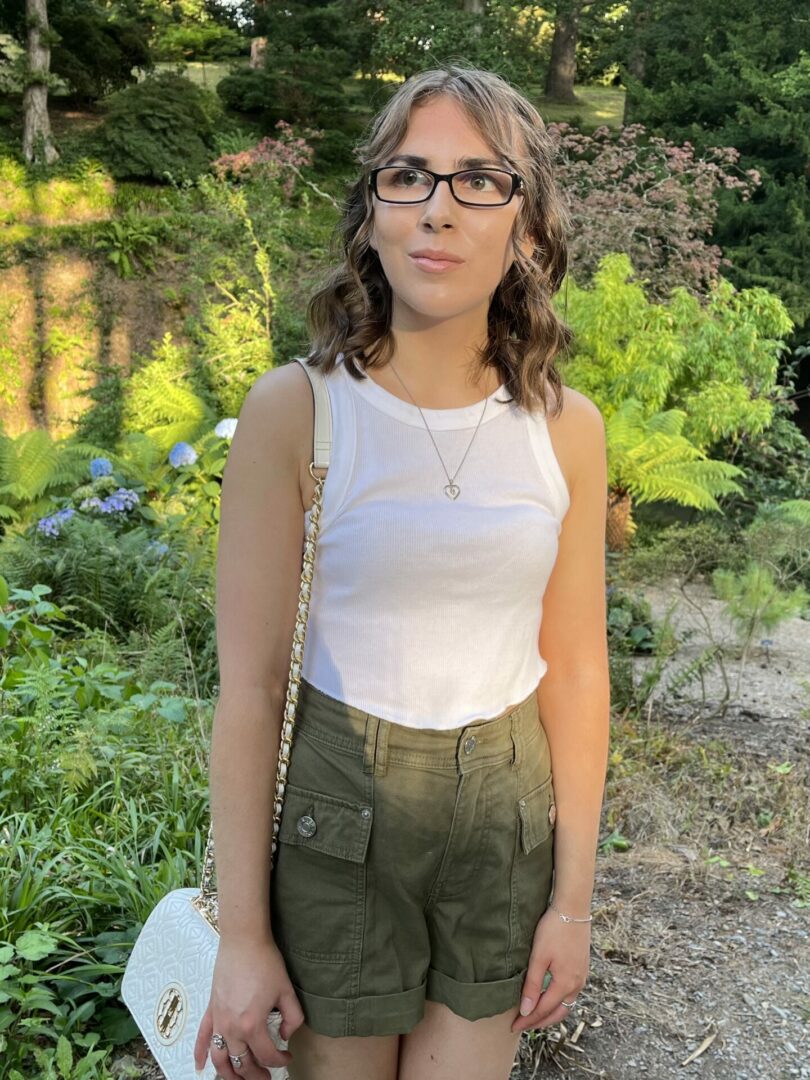Skip to content

For me, there has always been a precise blend of curiosity and worry when it comes to navigating life as a disabled person, evoking questions about independence, deterioration and the frivolity of shopping and how to go about doing so in an accessible way.

However, as someone who wasn’t immersed in the wider vision impaired or disabled community when I was growing up, I didn’t have anyone to direct my questions to. This meant that I turned to Google in search of answers, my fingers playing puppets to the curiosity that popped up in the crest of my anxieties about school, mobility aids and more as they typed and typed again, willing answers to show.
With disabled bloggers and content creators thin on the ground when I was a teen, I wasn’t coming across many answers I wanted so I spent a long time forging them myself before eventually becoming friends with other vision impaired people and discovering a safe space to share experiences, vent about the challenges and laugh about the mishaps.
The experiences and challenges I have and continue to face have equipped me with plenty of advice that I know my younger self could have benefited from hearing. My hope is to share as much of it as possible in this post and elsewhere on my blog so other vision impaired people are not left guessing.

So, let’s do my younger self a favour by answering some of the questions she had all in one place. I can only hope it proves helpful to other vision impaired people too.
To my younger self, I hope this gives you the answers you need.
Ah, yes, the question you will always remember as being one of the first you ever asked about your vision impairment.
RP is different for everyone who lives with it but it does ultimately mean deterioration in your eyesight courtesy of the breaking down of cells in your retina. This is medical lingo that you’ll become very familiar with over time and whilst early exposure to stereotypes and misconceptions try to convince you that things are not possible, please be assured that you will find ways of navigating the world in ways that are accessible to you.
ANY ADVICE ON HOW TO BEST DEAL WITH DETERIORATION?
The trajectory of your sight loss journey has always been written, there is a lot of deterioration to come and despite the fact that you expect it, it still has a tendency to corrupt your trademark positivity at times.
I wrote a mammoth post on this very topic so feel free to peruse that in your own time but, in short, allow yourself the space to feel all the emotions, embrace grief, let it swell but find ways of quelling it before it swallows you whole. How? Do the things you enjoy, continue to write about your emotions, exploit all that frustration and shape it into something that gives you strength.
Don’t hide how you’re feeling from those around you in fear of coming across as negative. You’re not negative, you’re human, navigating an unpredictable, daunting journey.
Do what you have always done and supplement the loss with all the positive things vision impairment brings to your life. Learn the ever-changing shape of your world as visual pieces of it fade away, be open about this and explain that you need different adaptions to what you are used to. Be honest with yourself as much as with anyone else.
Deterioration might alter the way you see the world but it doesn’t change who you are, remember that.

IS A CANE REALLY NECESSARY?
I’m afraid to break it to you my friend but yes, turns out, the cane is key to your independence. Different things work for different people when it comes to mobility and navigating the world independently but the cane is it for you, for now at least.
You might want to start with a symbol cane to ease yourself into the feeling of carrying a mobility aid in your hand, it’s a subtle indicator to those around you that you’re vision impaired without the full blown extension of a long cane. It’s all about those baby steps.
I know it’s easy to feel exposed, as if unfolding your mobility aid is an invitation for judgement but your cane will prove to bring you so much more than it takes away from you.
WILL I EVER STOP FEELING LIKE A BURDEN?
I’m going to start off by saying that you are not a burden in any way, shape or form, but I know how difficult it can be to shake that feeling.
It’s like a fire of unwanted emotions, flames marring your sense of belonging and blackening your requests for support until they fall to ash.
You’ll find it easier to douse the blaze as you grow up until just tiny embers remain, ignited only when provoked by fleeting moments of doubt that will eventually fade.
This feeling of being a burden is often symptomatic of guilt so maybe you’ll find this post about learning to leave guilt behind helpful and will be able to implement the techniques into your life sooner.

HOW CAN I MAKE LIFE AT SCHOOL EASIER?
Start by admitting when you’re struggling. Remember the point I made about being open when it comes to the deterioration you’re experiencing? That transparency is key when it comes to school and work.
When the letters written by thick black pen blur into a pool, swallowing each sentence whole, reach for the laptop, try not to worry about others sneaking glances over your shoulder, ask if you can pop earbuds in to listen to the screen-reader narrating your work and dim the brightness of your screen if it helps to assuage your anxiety. These are all reasonable adjustments that you have the right to make.
HOW DO I AVOID MAKEUP MISTAKES AS A VIP?
I know, I know, the oompa-loompa look you achieved after your first time applying foundation is not something you’ll be wanting to recreate any time soon, or ever, really.
You’ll soon pick up a few techniques that will make experimenting with makeup a little easier but here are just a few tips to help you find your feet.
Get to know your collection – A lot of products have very distinctive packaging these days which makes it easy to distinguish between items, even the smallest impression of a brand logo or the unique texture of a product can make it easy to identify and you’ll store that knowledge without a second’s thought.
Label the pranksters – Whilst many products have tell-tell signs on their packaging, some still exist to catch you out. If you’re unsure between a liquid lipstick and concealer, use PenFriend or braille labels to eliminate any doubt
Apply eye makeup first so you can wipe any fallout away without disturbing your base makeup.
Count every step – Knowing whether the look you’re trying to create is even and matching on both sides is one of the trickiest things to gauge when applying makeup as a vision impaired person so counting is key to ensuring things are as parallel as can be. It might mean that you have to disrupt your singalong session in favour of counting each stroke of the eye-shadow or bronzer brush but these are the sacrifices we have to make as VIP beauty lovers.

WHAT ABOUT FASHION, ANY TIPS?
There are a couple of blog posts on here that address this very topic but in short, make organisation a priority. Whether it’s organising your wardrobe by colour or garment type, having a system that works for you is so important when it comes to being able to find what you need quickly and easily.
I know of some vision impaired people who place a complete outfit on the same hanger too, a clever technique but not one I implement personally as I like to mix and match different pieces.
Trust yourself when it comes to the outfits you wear, if it makes you feel confident and comfortable, embrace that and if you have two of the same or similar pieces in your collection, always check-in with an app or another person who can identify the colour for you. From someone who mistakenly wore a burgundy skirt instead of the intended black and has the photos to prove it, double checking is never a bad idea.
WHAT’S THE BEST WAY OF BUILDING CONFIDENCE WHEN IT COMES TO GOING OUT AND ABOUT INDEPENDENTLY?
Start small. A five minute walk to a bench or postbox serves as a good foundation to build upon and even the shortest journey can help you go further in terms of your confidence when it comes to navigating the world independently.
Initial outings with your cane are not ones you have to do alone. Doing something as simple as using your mobility aid in favour of having someone guide you can help to improve your confidence when it comes to making it more of a regular feature in your life. Booking train assistance even when you’re travelling with someone else can also be helpful to begin with to increase your familiarity with the system.
I know independence can often feel like a game of Jenga, every walk or train journey you take feeling like building blocks in an effort to sustain a more permanent sense of confidence whilst anxiety shakily pinches one piece from the tower, trying to convince you that it will crumble.
Anxiety presents the fear that things will go wrong. *Spoiler alert*, sometimes it does. Sometimes your cane narrowly misses an obstacle which sees your forehead meet the cool brick of a pillar, painful at the time but funny anecdotes to share later. You’ll come face-to-face with discrimination and often, the train assistance you’ve booked doesn’t turn up, giving anxiety a space to luxuriate within.
As you hesitate to place the next building block courtesy of previous bad experiences and other barriers that exist, anxiety feeds on your inaction. It doesn’t wait for the convenience of your next turn and gets to work on removing more blocks, one after the other.
I’ve found that the only way to keep the tower steady is to trust the steps I’ve already taken to being independent. The longer I leave another journey following barriers in the last, the worse anxiety becomes.
If things go wrong this time, it doesn’t mean that they will the next. I’ve had some awful experiences when it comes to things such as failures in passenger assistance but there have been other times when everything has gone smoothly. Whilst the negative experiences can crush your confidence at times, I’ve learned that there are things to take away from the good and the bad. Barriers to travel are incredibly difficult to deal with but they do also afford you the space to practice different responses and coping mechanisms which, over time, aid in your pursuit of more confidence.
Reliable passenger assistance is vital for disabled people to be able to travel confidently but I’ve also learned not to put my independence in the hands of these services due to how unpredictable they can be.
Whether a journey goes well or completely pear-shaped, adopting techniques to deal with any situation is key and having them to hand will cement your confidence no matter what happens.

WHAT’S THE BEST WAY OF CONNECTING WITH OTHER VISION IMPAIRED PEOPLE?
There are so many different ways of connecting and getting involved with the vision impaired community. There are some fantastic local and national organisations who hold activities, events and social groups and whilst you might not have the confidence to attend right now, it’s worth chatting to the organisers to see what they offer incase something does eventually take your fancy.
If you’re still not sold on the idea of connecting in person, social media is a great tool for finding others in a similar situation. With so many disabled content creators populating the online space nowadays, there are experiences to relate to left, right and centre. Simply just hearing about these can serve as reassurance sometimes but if you want to go that one step further, leave a comment, send a message and relish that realisation that you’re not alone.
Blogging is of course how I’ve found my community and things such as Twitter (ahem, X, ahem), Instagram and Facebook have become an extension of that, allowing me to forge friendships and chat to so many other people who are in a similar situation which is so empowering.
WHAT APPS AND EQUIPMENT ARE THE MOST USEFUL?
The answer to this question will alter according to what stage in your journey you’re at currently. A lot of equipment will come and go, handheld magnifiers will be substituted with electronic ones which possess fancy features such as being able to freeze the screen and change the colour contrast.
But as more deterioration strikes, those aids will eventually be relegated to the championship of assistive technology, no longer having what it takes to stay in the Premier League.
There are the elites, of course, those who’s place will always be safe. Apple products such as the iPhone and MacBook are incredibly helpful with their handy built-in accessibility features. The apps I tap on the most are SeeingAI and Be My Eyes which are useful for reading documents, identifying money and now even generating detailed photo descriptions.
Away from the screen, things such as talking scales and a liquid level indicator are a must in the kitchen as well as non-slip mats to pop under a chopping board.
WHAT SHOULD I DO WHEN EVERYTHING GETS A LITTLE TOO MUCH?
Life as a disabled person comes complete with countless barriers so feeling overwhelmed is inevitable at times but there are ways of dealing with it.
Finding an outlet is incredibly important, whether that’s funnelling your frustrations into the written word or singing along to your favourite songs so loudly that the gravity of what you’re facing becomes a little lighter, even if it’s just for a few minutes.
Talking things through can also be invaluable, whether it’s with a friend or family member, someone from the VI community or, if you need it, a professional. There are so many people out there who are willing and want to listen.
Those overwhelming stages are ultimately lessons in disguise, something that can help you when the next challenge comes to light. I’ve found that many negatives can be turned into positives as the worries, challenges and experiences I’ve had have ultimately morphed into helpful nuggets of advice that I can share with others who are in a similar situation. Knowing that buoys me amidst the current of uncertainty.
So that’s it, a selection of questions that permeated the former stages of my teenage years. Plenty others popped up as I navigated the latter years and found myself curious and having to make decisions about further education, employment, friendships, relationships and life in my late teens and early twenties which means there’s more than enough material for a part two if that’s something you’d like to read.
If you’re a fellow vision impaired/disabled person, I’d love to know what questions you’ve had about navigating different challenges and stages in life and what answers you’d give to your younger self now. Have you had similar questions to the ones in this post? Did you find the answers you wanted when you needed them? Despite wishing I’d have heard some of these answers sooner, I do look back and feel proud of the courage I had to discover them in my own time. I still have questions about life as a vision impaired person even today so stick around as I have a feeling they’ll serve as inspiration for future blog posts. Who am I if I’m not writing about my experiences, after all?
Elin x .. @myblurredworld







